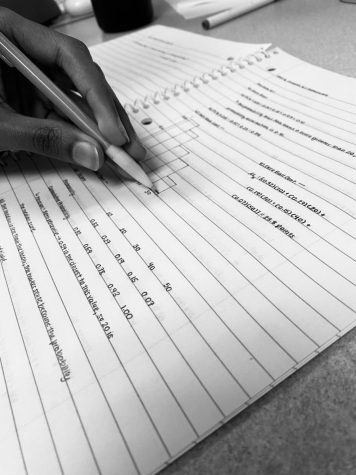Preparing for Midterms: Advice From Two Seniors
December 2, 2022
Midterm exams are coming up quickly here at OLHS, scheduled to begin on Wednesday, December 14th. So, for all of you procrastinators out there, here are some study tips from two seniors:
 Start early: We know it might be too late for this advice, but we’ll give it regardless. The single best way you can prepare for exams is to begin studying at least two weeks in advance. Cramming the review of a semester’s worth of material in two days is not only ineffective but can also induce additional stress in the days before your exam. By starting to study earlier, you can ensure that you have enough time to adequately review all of the semester’s material. This also allows you to increase your familiarity with the content and thus, become more confident before you take the exam.
Start early: We know it might be too late for this advice, but we’ll give it regardless. The single best way you can prepare for exams is to begin studying at least two weeks in advance. Cramming the review of a semester’s worth of material in two days is not only ineffective but can also induce additional stress in the days before your exam. By starting to study earlier, you can ensure that you have enough time to adequately review all of the semester’s material. This also allows you to increase your familiarity with the content and thus, become more confident before you take the exam.- Study smarter, not harder: You already hear this from every teacher, and you’ll keep hearing it. Why? Because it’s good advice! Reading the entire textbook before an exam will leave you feeling both overworked and underprepared. Instead, try re-writing key terms, doing practice problems (for math and science exams), making your own practice tests, and using study tools—we recommend knowt, a free, Quizlet-like website. Additionally, take advantage of any and all material provided by the teacher. They know what is on the exam, so it’s probable that their study material will be helpful.
- Stay away from study groups: Study groups can be a good way to get work done and have fun. But you should only join one if you truly need the guidance of your peers. Oftentimes study groups with your friends can dissolve into a light-hearted conversation and distract you from your purpose: to study! We’ve joined study groups with friends in the past, and we spent more time talking than studying. And even when we were studying, we often had to study concepts that we already knew, which prevented us from addressing our individual weaknesses.
- Ask for help: Teachers can be intimidating, and we understand that, but they are here to help you. In the end, your teacher can (hopefully) answer all of your questions, better than a random friend or your parents. Teachers want to help! Many are willing to schedule a meeting with you before/after school or during their free period. A couple of teachers will even schedule a Microsoft Teams meeting in the evening, if that’s more convenient. If you can’t schedule a meeting with a specific teacher, the Patriot Lab is a good place to go and get help.
- Make a schedule: Studying requires discipline; you have to make the most of your time. We know that for most of you, there are numerous clubs and extracurricular activities taking up room in your schedule, not to mention your actual homework. So, in order to ensure that you have plenty of time to study every subject, schedule time blocks dedicated to each class every evening.
- Take breaks: Whether for sleep, extracurriculars, or fun, taking breaks from studying is one of the best ways to be successful on exams. Studying for ten hours straight, or pulling an all-nighter before exams is not going to make you more prepared. Rather, it will only increase your stress levels and add exhaustion to the mix. Additionally, extracurriculars like sports are great for stress relief!
- Never multitask: Multitasking (aka task switching) between studying and watching TV, texting your friends, or talking to your friends will only decrease your concentration and increase the amount of time that you spend studying. In fact, multitasking prevents you from fully engaging in reviewing the material. While it may seem like you are completing two tasks at once, in reality, you are only increasing distractions and reducing productivity. We recommend putting your phone in a different location, or, if you’re a music listener, download a focus app.
- Trust yourself: You know your strengths and weaknesses better than anyone else! Focus on what you know you need to work on, rather than what your friends are struggling with or reviewing all of the material. In the end, when you’re taking the exam, you have to be able to trust that you know what you’re doing.
Applying these strategies while you are studying will maximize your productivity and guide you as you navigate exams, both in high school and beyond.


